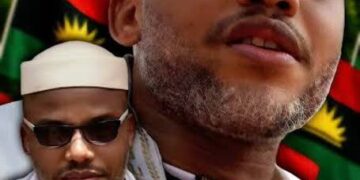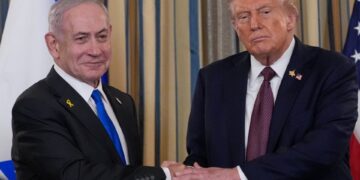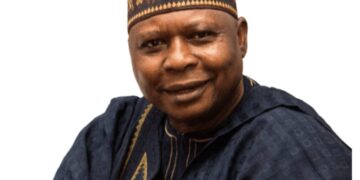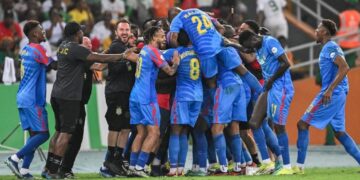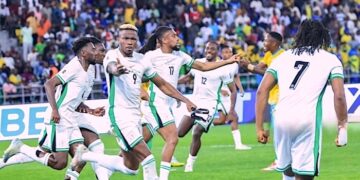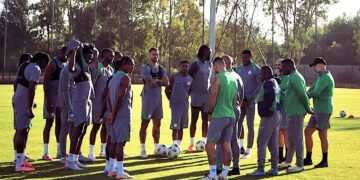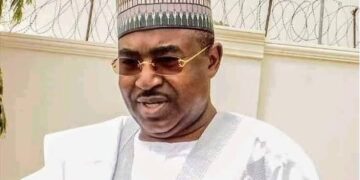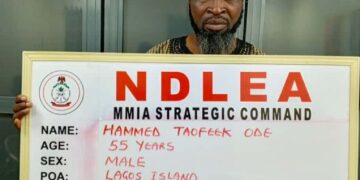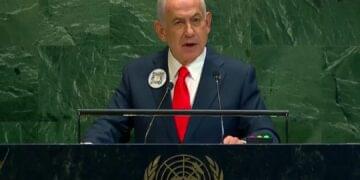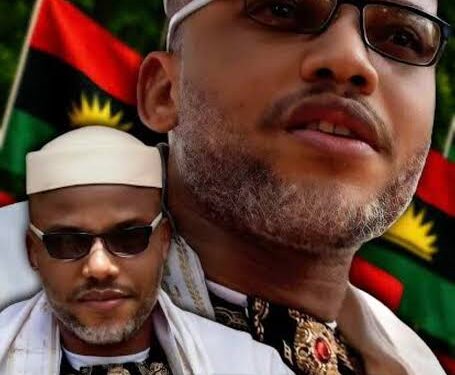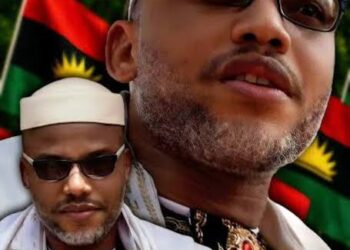By Ehichioya Ezomon
Thursday, November 20, 2025, is ‘Judgment Day’ for the leader of outlawed Indigenous People of Biafra (IPOB), Mazi Nnamdi Kanu, on the alleged seven-count terrorism charge filed against him by the Nigerian Government at the Federal High Court in Abuja, Nigeria’s capital city.
Many never saw this day coming eight months after a new judge took over the trial that began with treasonable felony charges against Kanu, and dragged on for years, with the courts entertaining same or similar issues randomly.
Trial judges were changed; lawyers swapped or sacked; charges amended; motions and applications filed; orders made; adjournments granted; and the case moved from the High Court to Appeal Court to Supreme Court, and back to the High Court. Finally, judgment beckons!
Justice James Omotosho, the new judge assigned to the case in March 2025, fixed the judgment after Kanu (defendant/applicant) failed to utilise the six days the court allotted to him to “enter defence,” or be deemed to’ve waived his right accordingly.
Kanu declined to enter defence on the grounds that “he’s being tried under a non-existent law; the court lacks the jurisdiction to continue with the case; and he’s unjustly detained, and should be set free to go home” from the custody of the Department of State Services (DSS) in Abuja where he’s been detained since 2021.
On Tuesday, November 4, 2025, Justice James Omotosho gave Kanu a 24-hour window to determine the consequences of his refusal to enter defence, or “be deemed to have waived his right to do so,” and adjourned sitting till November 5.
But on that Wednesday, Kanu stood his ground not to enter defence, and sought extra time to consult with his lawyers on the next move. The judge obliged him, and fixed Friday, November 7, for one more final chance for Kanu to mend his legal ways.
That wasn’t to be, as Kanu’s relatives alleged, on the night of November 6, that some DSS operatives were “deliberately stopping him from preparing his defence in court,” which “might result in his absence in court on Friday… not because he does not want to, but because he has been denied the opportunity to prepare and defend himself.”
The allegation was contained in a statement by Prince Emmanuel Kanu in which the family called on the international community to urge Nigeria to stop violating Kanu’s right to a fair hearing, listing what the DSS allegedly did in the process, viz:
• Stopping his visitors, including family members, lawyers, and recording his meetings with lawyers & family, instead of allowing private and free discussion as required by law. • Refusing to give him access to a computer and printer necessary for the preparation of his processes and blocking him from filing his own court papers. • Declining to take him to the court registry to submit the documents he intends to use for his defence.
Claiming that, “these actions are in violation of the Nigerian Constitution and basic human rights,” the statement noted that, “Every accused person has the right to facilities to help him prepare adequately and to interact freely with their lawyers, family, witnesses, prepare for court, and defend themselves – but the DSS is stopping Mazi Kanu from doing so.”
It warned: “If Mazi Nnamdi Kanu cannot appear in court or defend himself, the DSS and the Nigerian Government should be held responsible. We call on the the world to take note: the United Nations, African Union, European Union, the Commonwealth, Human rights groups and all people who believe in justice to pay close attention to what is happening. The Nigerian Government cannot claim to follow the rule of law while silencing a defendant and blocking his right to a fair hearing.”
Though Kanu’s in court that Friday, his complaints prompted Justice Omotosho to direct that the court’s registry be temporarily relocated to the courtroom, “to allow him complete the filing process without further delay,” and stood down the case for one hour.
But in the process he filed, Kanu repeated that his trial was based on a repealed and non-existent law, and challenged the competence of the charge, and jurisdiction of the court to try him.
Having earlier accused the court of “overlooking a Supreme Court judgment confirming the non-existence of Section 47 of the Criminal Code Act (CCA),” and that Section 36(12) of the Constitution prohibits being subjected to trial under a non-existent law, Kanu announced filing a motion for five reliefs, and a nine-point affidavit, praying the court to strike out the case, and release him, viz:
• An order expunging, from the records of the court, the purported plea of “not guilty” he entered on March 29, 2025, the same having been obtained under deception, coercion, and in clear violation of Section 36(6)(a) of the Constitution of Nigeria, 1999 (as amended), and in defiance of the Supreme Court binding directive in FRN v. Nnamdi Kanu (SC/CR/1361/2022).
• An order setting aside all proceedings conducted pursuant to the said defective plea, including, but not limited to the scheduling of defence, witness summons, and trial dates, the same being founded on a nullity ab initio. • An order declaring that the seven-count charge dated March 29, 2025, discloses no triable offence known to law, having been founded on repealed statutes (listed).
• An order striking out the charge in its entirety for want of jurisdiction, the same being incompetent and void ab initio. • An order directing the immediate release of the defendant/applicant from custody, there being no valid charge pending before the court.
• And the nine grounds Kanu hinged his five prayers include that: On March 29, 2025, upon being asked by the Registrar whether he understood count one of the charge, he unequivocally responded ‘I don’t’ – a fact indelibly recorded at page 12 of the Certified True Copy of the record of proceedings.
• Despite his clear protestation of non-comprehension, the court failed to halt proceedings, offer explanation, or ensure understanding in a language he comprehends, thereby breaching Section 36(6)(a) of CFRN. • The subsequent ‘I do, yes’ and plea of ‘not guilty’ were procured under pressure and without curing the initial constitutional defect, rendering the entire plea-taking exercise a nullity.
• The charge is founded on repealed statutes – statutorily noticeable under Section 122 of the Evidence Act, 2011 – and remains unamended despite the Supreme Court’s explicit directive on December 15, 2023 that count 15 (formerly mis-citing the Criminal Code) be amended to reflect the Customs and Excise Management Act (CEMA).
• By Section 36(12) of CFRN, no person shall be convicted of an offence not defined in a written law in force at the time of commission. The prosecution’s reliance on repealed laws violates this constitutional safeguard. • The prosecution’s continued use of the unamended, defective charge constitutes a gross abuse of court process and contempt of the Supreme Court’s binding judgment under Section 287(1) CFRN.
• Sections 220 and 221 of the Administration of Criminal Justice Act (ACJA), read with Section 165 of the Evidence Act, compel the setting aside of proceedings founded on a materially defective plea, especially where the accused was misled and prejudiced.
• This court lacks jurisdiction to proceed on a charge that discloses no offence known to law. Jurisdiction is the lifeblood of adjudication; without it, all proceedings are void ab initio. • The defendant has been in custody since June 2021 without a valid charge – a continuing violation of his fundamental rights under Sections 35 and 36 CFRN.”
Following submission of prosecution’s lawyer, Adegboyega Awomolo (SAN), that he didn’t need to file a counter affidavit, but would “rely on the exhibit attached to the motion Kanu just moved,” Justice Omotosho, after reviewing the entire proceedings, adjourned for judgment on November 20.
Remarkably, Kanu’s case has spotlighted that though judges must “dispense justice to all manner of people without fear or favour or affection or ill-will,” they also strive to guide and assist litigants, as Justice Omotosho demonstrated during the accelerated hearing.
At separate proceedings, the judge pleaded with Kanu – who represented himself after he sacked his lawyers – to enter defence, and not rely on a dismissed “no case submission” that went up to the Supreme Court, which agreed that a “prima facie case” was made against him, and he should stand trial.
Spicing the proceedings with a biblical touch, the judge, on Tuesday, November 4, appealed to Kanu, “three times,” to enter defence, and yet, Kanu denied there’s law in Nigeria’s corpus to try or continue to detain him. (Reminds of Matthew 26:34, 75 when Peter, as Jesus Christ prophesied, denied Him three times before the cock crowed)
As reported by The Nation on November 5, the judge, ruling on Kanu’s decline to enter defence “for the last time,” turned to him in the dock, and said: “Just like I did the other time, I appeal to you, in the name of Almighty God, to get a legal expert that can put you through. When I said lawyer, it is not just a lawyer, but one that is conversant with criminal proceedings. In the name of Almighty God, you need to get a lawyer to put you through.
“The law has given you the opportunity to put in your defence. If you say you are not calling witnesses, the court cannot force you. My dear brother, I appeal to you, in the name of Almighty God, to get a lawyer, who is an expert in criminal law to put you through.”
Similarly on Friday, November 7, Justice Omotosho held that as it’s in the case in the Bible when God gave Adam the chance to explain why he ate the apple (forbidden fruit) (Genesis 2:16-17) he, as a Christian, had given Kanu the opportunity to defend himself, adding, “I have, on some occasions, appealed to him, in the name of God, and advised him to get the service of a lawyer knowledgeable in criminal procedure.”
Like the horse taken to the river but can’t be forced to drink, Justice Omotosho held that Kanu couldn’t complain of being denied the constitutional right to fair hearing since, “on his own volition, he failed to utilise the opportunity given him to defend himself,” adding he couldn’t also be compelled to utilise the opportunity for fair hearing, as “he is free to waive it if he chooses.”
“The defendant has been given ample opportunity to defend himself in this case. I hold that the defendant has waived his right to open his defence,” the judge said, and held that the two motions filed by Kanu, challenging the court’s jurisdiction, would be determined at the time of the final judgment.
Earlier, Kanu accused the court of “overlooking a Supreme Court judgment confirming the non-existence of Section 47 of the Criminal Code Act (CCA),” and that Section 36(12) of the Constitution prohibits being subjected to trial under a non-existent law.
“I believe there are a few misconceptions here. There is no valid charge against me,” Kanu said, as he read from a Supreme Court judgment, and argued that the Terrorist Prevention Act 2013, under which he’s being tried, had been repealed.
Vowing not to return to detention, he said: “The fact that this court has refused to take judicial notice of a repealed law vitiates this trial. Why are you asking me to enter defence when there is no law under which I am being tried? I cannot go back to custody unless this court tells me under what law that I have been charged.”
Asking Kanu to read Section 36(12) of the Constitution to the hearing of the court, “which he did,” Justice Omotosho stated that the section “wasn’t applicable at the current stage of the case,” saying, “It is when you have entered your defence or rest your case on the prosecution’s case that, at the judgment stage, it would be determined whether or not you can be convicted.”
Noting that it’s the same Supreme Court – whose judgment Kanu quoted from to support his claim that “his trial was unlawful” – that sent the case back to the Federal High Court for the defendant to be tried on the remaining seven counts of terrorism, the judge said, “If the Supreme Court did not see the need for the defendant to be subjected to trial, it would not have sent the case back for trial.”
But Kanu’s unmoved, saying: “This is constructive denial of fair hearing. You cannot send me back to detention without telling me under which law I am being tried,” and informed the court that he’d filed a motion and an affidavit, which “raised threshold issues about the court’s jurisdiction to continue to hear the case.”
Prosecuting lawyer, Adegboyega Awomolo (SAN), faulted the “competence of the fresh documents,” and urged the court to “desist from further indulging the defendant,” and prayed it to deem the documents as Kanu’s “final written address,” and direct the parties to adopt their final addresses and adjourn for judgment.
It’s at this stage that Justice Omotosho, – “taking judicial notice” that Kanu isn’t a lawyer, and should be given “an opportunity to consult a lawyer and get necessary support” – pleaded with him, three times “in the name of Almighty God,” to seek expert legal advice.
All this seems academic now, as the die is cast for judgment, and Justice Omotosho either holds that the prosecution has proved, “beyond reasonable doubt,” its prima facie case against Nnamdi Kanu, and proceeds to convict and sentence him; or “finds merit” in his claim of “no case,” strikes out the suit, and sets him free. And the epic case is finally closed, hopefully, this Thursday!
* _Mr Ezomon, Journalist and Media Consultant, writes from Lagos, Nigeria.

